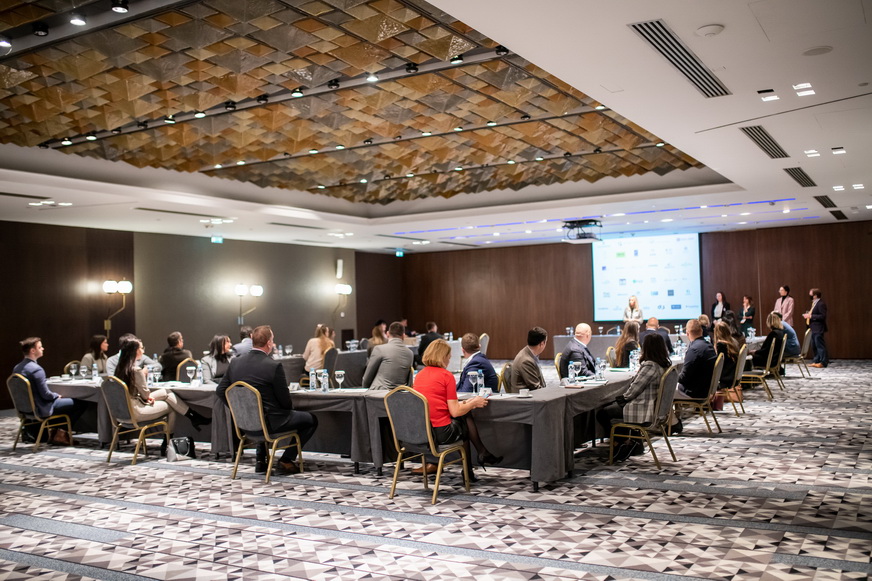Together with the public institutions in Serbia and other chambers of commerce, we strive to create even better conditions for the development of the Serbian economy and foreign investments.
The very good economic cooperation between Greece and Serbia and numerous Greek investments in the Serbian economy would not have been possible without the strong support of the Hellenic Business Association (HBA). We spoke with the HBA director, Fanina Kovačević-Popaz about the Association’s cooperation with public institutions and other chambers of commerce in our country.

The Hellenic Business Association in Serbia appointed a new board of directors in May. Who are the new board members and what will their business policy be in the next mandate?
At this year’s session of our General Assembly, held in May, our members elected a new Board of Directors – Nikolaos Sliousaregko (the Junior Hotel) is the Board’s new Chairman, Vuk Dapčević (Eurobank Direktna) is the Deputy Chairman, while Vassilis Karanasios (Coral SRB – Official Shell Licensee), Stylianos Tsoktouridis (Alumil YU Industry) and Georgios Karafergias (Roda Točkovi) are elected as Board members. During its two-year mandate, the newly elected Board of Directors will contribute to the accomplishment of the Association’s main goals relating to its visibility by the public institutions in Serbia and Greece, active representation of the Greek business community interests in Serbia, as well as to improvement of cooperation, both among members and with other local and foreign companies.
Further, the new Board of Directors initiated a series of new activities aimed at better visibility and additional promotion of each Association member. These activities include monthly visits of Board of Directors to the Association members, events hosted by member companies, as well as interviews with members’ representatives, which are now special supplements in our Newsletter. At the same time, the Association will continue to organize activities that our members are used to, both for top management and for representatives of middle management. These include traditional celebrations, informal gatherings, sectoral workshops and seminars. As before, special attention will be given to humanitarian activities and the promotion of the Greek language and culture in Serbia.
Your Association also focuses on social and humanitarian work, as well as the promotion of Greek cultural values in Serbia. Which related activities would you like to single out as the most significant in the previous period?
As pioneers among foreign investors in Serbia, Greek companies have been strongly focusing on humanitarian campaigns and socially responsible projects for more than two decades through an active contribution to the development of local communities, environmental protection and the improvement of society in Serbia, as the host country, in its entirety. With the valuable support of our members, the Association strives to promote this kind of Greek business practice. At our traditional Christmas dinner, which is just one of the examples of such practice, we organized a humanitarian lottery to collect funds for the purchase of necessary products for the daily life of children accommodated at the Dr. Milorad Pavlović Children’s Village in Sremska Kamenica.
A predictable and stable investment environment is important in preparing realistic business plans and their practical implementation
Also, in cooperation with the Hellenic Foundation for Culture, and with the blessing of His Holiness the Patriarch of the Serbian Orthodox Church, Mr. Porfirije, we awarded scholarships for learning the Greek language to students of the University of Belgrade’s Orthodox Theology Faculty, who want to learn the modern Greek or to continue their studies in Greece. This initiative also reflects the intention of the Hellenic Business Association of Serbia to strengthen and improve the cultural and historical ties between Greece and Serbia.
HBA has been traditionally organizing workshops and lectures on topics that are important to business people in Serbia. What are the HBA’s latest activities in this regard and how do they contribute to creating a more favourable business environment?
The Hellenic Business Association of Serbia organizes different events for its members in order to facilitate their networking, connection and exchange of experiences. The HBA also provides to its members the full support in communication with Serbian and Greek institutions and in protection of their interests. Sectoral events that we hold, including workshops and lectures, give opportunity to our members to do business in a predictable environment, as they inform them about current topics and at the same time represent a platform for exchanging business information. In April, in cooperation with our member company V+O Communications and colleagues from the Croatian and Belgian associations, we organized a very successful workshop called “Digital Marketing in the Service of Your Business”. On this occasion our members had opportunity to hear more on the importance and use of the full potential of digital marketing through proven effective strategies.
In recent years, Serbia has taken significant steps to build stable environment for the country’s economic development
During the workshop, the participants had a practicalassignment , as a way to practice their skills, exchange ideas with other participants and get feedback from the lecturer. Recently, and in cooperation with the Belgian-Serbian Business Association and the Croatian Business Club, we organized a workshop on inspection procedure and practical implementation of systemic legislation, titled “Rights and Obligations of Supervised Business Entities during Inspection Procedures”.
Do you collaborate with other business associations of foreign investors in Serbia and if you do, what is this collaboration like? Could you tell us about your cooperation with state officials in Serbia, i.e. government ministries, chambers of commerce, associations and government agencies?
Our association actively cooperates with bilateral chambers in the country, since this type of synergy has proven to be a good basis for networking between local and foreign companies. In the previous period, we organized many joint activities, both at the inter-chamber level and with representatives of public institutions and ministries, which recognized the dialogue between the companies and the state as an important link in improving the business environment. The webinar with the National Employment Service, organized by 12 bilateral chambers of commerce, as well as the webinar with the Ministry of Mining and Energy, organized by the French-Serbian, German-Serbian and Italian-Serbian chamber of commerce, as well as the Belgian-Serbian Business Association and our Association, are all good examples of this kind of cooperation.
I would especially like to single out that our Association has strengthen its cooperation with the Ministry of Economy, led by Minister Atanasković, who was the guest of honour at our traditional celebration of the Vasilopita Cutting this year. Regarding inter-chamber activities, two traditional gatherings of bilateral chambers’ members were organized this year – the International Coffee Break within the Kopaonik Business Forum, the International Networking Cocktail, as well as the well-known Speed Business Meetings that connect member companies.
What are the biggest obstacles that Greek investors in Serbia had to overcome? What are the benefits of doing business in Serbia?
A predictable and stable investment environment is important in preparing realistic business plans and their practical implementation, both for Greek and other companies in the Serbian market. The growing number of international companies in Serbia confirms that in recent years Serbia has taken significant steps to build a stable environment for the country’s economic development, which also proves that investors have recognized the positive economic and investment climate in the country. Free trade agreements that facilitate access to numerous markets, both inside and outside the EU, tax regulation and a flexible legal framework, as well as development of inter-regional connections through the initiative to form a single regional market in the Western Balkans are just some of the benefits of doing business in Serbia.
Certainly, there are challenges that Greek companies have been facing and these are mostly related to the Serbia’s EU integration process. The long period of harmonization with EU legislation, judicial reform and complex procedures for obtaining various business licenses, as well as customs procedures for imports are definitely the biggest challenges not only for Greek but also for other foreign companies that would like to expand their activities to the Serbian market. By solving these problems, Serbia would certainly become one of the most desirable countries in the region for investments.
